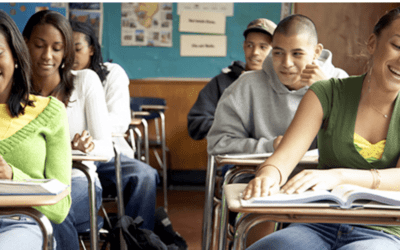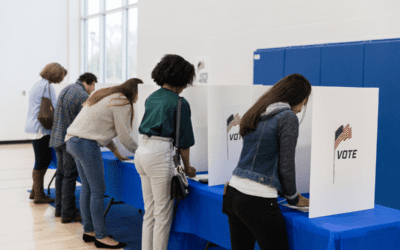
#image_title
Lawmakers propose solutions, but other leaders fall back on election year ‘law and order’ tactics
Today she is state Assembly Representative Shelia Stubbs, co-author of a new bill that aims to decrease racial profiling. Less than two years ago, she was a target of it – while a candidate for a seat in the Legislature.
Stubbs, now the first African American to represent the 77th Assembly District in Madison, was at the time a member of the Dane County Board of Supervisors. While campaigning for the higher office in August of 2018 she was approached by a police officer.
Someone in the predominantly white neighborhood where she was knocking on doors and handing out flyers had called the police to report her car parked on the street and “suspicious drug activity.” The anonymous caller told dispatch, “I would like them moved along.”
The experience made headlines, shook her confidence and stripped her of her dignity. The worst part was her mother and 8-year-old daughter were there to witness it, she said.
“My race was out of place for that community,” said Stubbs at a press conference Friday. “And all I was doing was knocking on doors.”
Stubbs was joined Friday by members of the African-American community including former Madison Police Chief Noble Wray, Rep. David Bowen, D-Milwaukee, and more than a dozen supporters to introduce a bill that would allow victims of racial profiling by proxy to take civil action. Citizens who unnecessarily contact the police as a way to harass people of color by asking officers to check on them or ask that they be moved could face a $250 fine.
Wray said the state of Washington has a similar law in place. He added everyone remembers encounters they have with police officers. And in Wisconsin, encounters between law enforcement and African-American men and teens disproportionately land them in jail.
Two reports in 2013 outlined the extent of the problem. Specifically, a UW-Milwaukee study found that the state’s incarceration rates were the highest in the country for black men, with 13 percent of the state’s black male population behind bars. The percentage was nearly double the rest of the country.
That same year, the Race to Equity Report was released by Kids Forward, a Madison-based non-profit that works for equity for all children. The report focused on Dane County, including Madison, a city with a reputation as a strong Democratic enclave with progressive values. The findings showed a much different narrative.
The report found three-quarters of the Dane County’s African-American children live in poverty, compared to five percent of white children; that half of all black high school students were not graduating on time compared to 16 percent of white students; African-American children were 15 times more likely than their white counterparts to land in foster care, and black teens were six times more likely than white teens to be arrested.
Since then, lawmakers have been trying to build bipartisan support for criminal justice reform that begins to chip away at the institutional racism. Little has changed. So-called tough on crime bills still play well to the Republican base, say Bowen and Crowley, and bills introduced by Democratic lawmakers to rehabilitate juveniles or reform the system through less-punitive processes rarely gain traction.
This dynamic was in play last week when Republican lawmakers from communities surrounding Milwaukee, but no African-American lawmakers that represent Milwaukee, introduced a “tougher on crime” bill package. The bills include setting mandatory minimums for retail theft to raising penalties for witness intimidation.
In contrast, Assembly members Stubbs, Bowen, and Rep. David Crowley, D-Milwaukee, have collectively or individually put forth bills that address crime and punishment but not to the detriment of the state’s black communities.
“What Bowen, Crowley and Stubbs are saying is that they agree we need to do something now to address Wisconsin’s racial disparities,” said Erica Nelson, director of the Race to Equity Report and author of the 2013 initial report. “Their proposals are ones that address the problem through the lens of racial disparity.”
For example, one bill that would limit the amount of time an inmate with a serious mental health illness can be placed in solitary confinement to 10 days. Another, the Youthful Offender Act, prohibits a court from sentencing anyone under the age of 18 to life in prison without the possibility of parole or release to extended supervision. It also eliminates statutory mandatory life sentences without parole for youthful offenders in order to align with federal constitutional law.
A bill dubbed the Community-Police Relations Act would require the Wisconsin Department of Justice to allocate up to $5 million annually in grants to cities or counties with minorities comprising at least ten percent of the population. Another would require that an economic impact statement accompany every bill relating to crimes and criminal penalties to assess its impact on communities of color.
“Even a bill proposed with the best intent can have a wide-ranging impact on populations who, historically, have lacked a strong voice in government,” states the bill’s summary. “Racial and economic disparity in Wisconsin is among the highest in the nation and, despite the best efforts by some, shows no sign of shrinking.”
Another bill would prohibit the use of restraints on anyone under the age of 18 when appearing in court.
Crowley said when discussing crime with Republicans in a one-on-one setting, the Republican lawmakers are in agreement that their bills have merit. But once the bills begin to be circulated for other legislative support, little to nothing happens, he said.
“It might get them (Republicans) political wins, but the tough-on-crime stance will not get us any real change,” Bowen said. “The current system, with incarceration as the top choice, is like the monster that can’t control what it eats. We have a chance in Wisconsin to support a system that is much more community-based and less expensive.”
Nelson added that while the Race to Equity Report and ongoing research has resulted in a vast increase in public awareness concerning Wisconsin’s deep racial inequalities, true reform will not occur overnight.
“We have to hold two things at the same time,” she said. “As Martin Luther King said, there is the fierce urgency of now. But we also have to have patience.”
Stubbs said a first step toward changing the statistics is for people outside communities of color to first believe such inequities exist.
“What I am working toward is, how do I get you to believe me? How do I get you to be my white ally, to stand by my side and support me, instead of being my white savior,” she said.
Bowen said rising prison costs may be what eventually brings true reform to Wisconsin.
“At this time, true reform is seen as being expendable. Every year that passes by and we don’t close Lincoln Hills, we don’t reduce the prison population and we don’t move in the direction of moving more people into the community instead of just throwing them into these facilities is a missed year of savings,” he said. “And that’s what I really want my Republican colleagues to understand. I get to the conclusion that these reforms are needed based on moral reasons. I don’t mind getting there based on financial reasons, too.”

Opinion: Many to thank in fair maps victory for Wisconsinites
On February 19, 2024, Governor Tony Evers signed into law new and fair state legislative maps, bringing hope for an end to over a decade of...

Opinion: Empowering educators: A call for negotiation rights in Wisconsin
This week marks “Public Schools Week,” highlighting the dedication of teachers, paras, custodians, secretaries and others who collaborate with...

Op-ed: Trump’s journey from hosting The Apprentice to being the biggest loser
Leading up to the 2016 election, Donald Trump crafted an image of himself as a successful businessman and a winner. But in reality, Trump has a long...

Not just abortion: IVF ruling next phase in the right’s war on reproductive freedom
Nearly two years after the US Supreme Court overturned Roe v. Wade, another court is using that ruling to go after one of the anti-abortion right’s...




